Falling for a trick a real estate agent plays on you can cause all sorts of emotions.
Guilt, shame, anger, frustration…
And betrayal by the person you trusted to handle your real estate transaction.
But your emotions aren’t the only thing at risk.
Being deceived by a tactic used by a Realtor can cost you a whole lot more than you think.
The problem?
Some real estate agents are wolves in sheep’s clothing.
It’s not easy to spot the tricks that crooked Realtors will use against you.
This holds true whether you are currently searching for an agent or already working with one.
But this is where I can help…
I’ve been in the trenches and can spot these dubious strategies from a mile away.
I’m going to expose the shady real estate tactics you need to know.
You’ll learn what to watch out for with real estate agents so you can sidestep the deceptive tactics.
Here are the top seven tricks real estate agents might play on you.
1. Convince homeowners to sell off market
Persuading a homeowner to sell off market is one of the shadiest tactics used by real estate agents.
This trick is generally geared toward home sellers who have a house that could use some updating.
Why?
Because this scheme relies on the agent suggesting that the home’s condition will significantly hinder prospective buyers from making an offer.
The agent’s goal is to put the seller in a state of worry so that they’re more likely to fall prey to their plot.
Then comes the pitch.
“I have a buyer who may be interested in your home.”
That buyer is a real estate investor.
The agents who orchestrate this plot have relationships with investors.
But not just a typical agent-buyer relationship.
It’s a long-term partnership that makes both the real estate agent and the investor a boatload of money.
How?
The agent turns one commission into three by representing the:
- Seller in the off-market sale
- Investor in the off-market sale
- Investor after the property is updated and listed on the market.
The triple commission is how investors lure in the shady agents.
Here’s one example of many emails and texts I used to get before founding SoldNest…
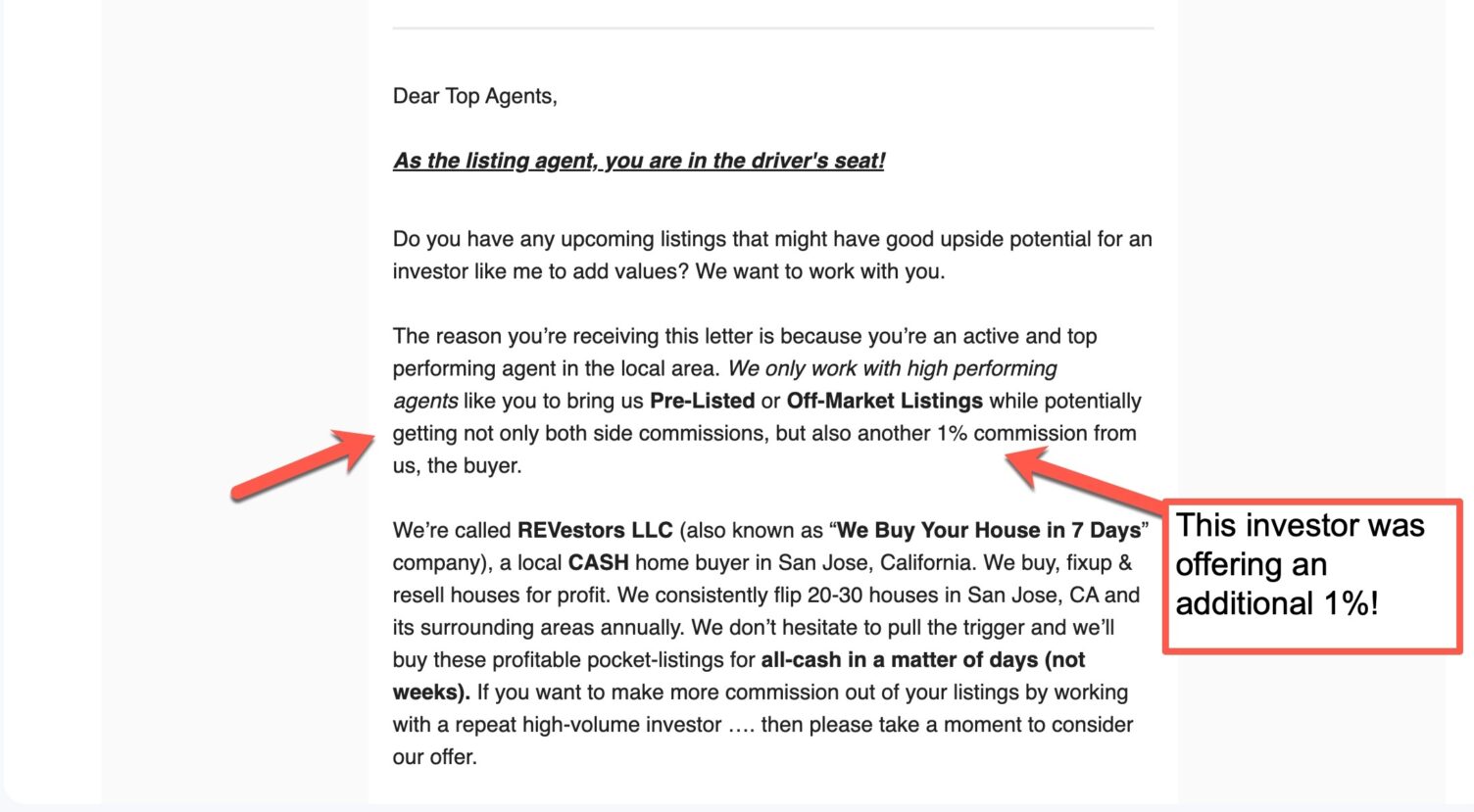
The result of falling for this trick is letting the investor make a massive profit that should have been yours.
Which means the price you’d sell your house for would be well below market value.
In most cases, at least ~20% lower than what you could get by putting your house on the market (sometimes ~30-40%).
This is why you need to be aware of the intent behind an off-market buyer when selling a house for cash.
So what should you do if an agent attempts to orchestrate this plot on you?
Fire them — or don’t hire them.
They’re trying to convince you to transfer money from your pocket into theirs.
2. Overpromise on the listing price
Most sellers would love for a buyer to pay a ridiculously high price for their home.
The shady real estate agents use this to their advantage.
How?
By exaggerating how much they can sell a house for.
Any prospective listing agent will provide you with their opinion of what they think your home should be listed at.
They may present this price estimate to you during your initial agent consultation — or a day or two after.
But spotting the agent’s price illusion is tricky.
That’s because some agents are experts at manipulating a seller into thinking their house is worth more than it is.
Why would they do this?
To get you to sign the exclusive agent listing agreement.
They know that your home will sit on the market and you’ll need to reduce the price.
But…
They’re okay with this because they have you locked into a contract.
Which means they still get a commission as long as your house eventually sells.
The issue is that homes lingering on the market for too long often sell for less than their potential value had they been priced correctly from the outset.
How can you avoid this trick?
First, never pick an agent solely based on their recommended listing price.
The highest price may seem tempting, but an agent doesn’t dictate what your house is worth — your local real estate market does.
Second, keep your opinion about your home’s value to yourself.
You are less likely to be tricked by an agent if you don’t give them a number to work with.
This is why your price expectations are one of the key things you should not say to a real estate agent when selling.
3. Lie about having an interested buyer
“I have buyers looking for a home just like yours.”
That’s the way this sneaky trick starts.
You’ll usually see some variation of this verbiage on mailers or on an agent’s website.
And you might hear this misleading statement when receiving a cold call or a knock on your door from a local real estate agent.
The agent’s goal?
To exacerbate the anxiety that some sellers feel about whether a buyer will be interested in their home.
So they leverage this secret tactic to secure a preliminary meeting.
All while knowing that there isn’t a real buyer.
The ploy continues when the agent shifts the narrative to why the seller should choose them as their listing agent.
They’re discussing the home’s value, their marketing plan, etc.
Then one of two scenarios will usually happen…
The seller forgets about the “buyer” and hires the agent.
Or…
The agent says that in order for the “buyer” to view the home, the seller needs to sign a listing agreement with them (which isn’t true).
Alarm bells should be ringing if an agent uses this tactic on you.
Because there’s only one of two things happening with this trick…
Either the real estate agent is lying…
Or there really is a buyer and the agent wants to represent both parties to double their commission.
4. Persuade a seller to accept their buyer’s offer
What makes the crooked real estate agents pull out their top covert maneuvers?
An opportunity to earn two commissions from representing both the seller and the buyer in the same sale.
This is known as a dual agency transaction, creating a powerful incentive for agents.
That’s why pitching a dual agent scenario is one of the deceptive games real estate agents play with sellers.
The clandestine strategy starts when the agent knows that their selling client is fearful of prospective buyers not being interested in their house.
This is the key ingredient for this Realtor trick to work.
Why?
Because the more fearful a seller is, the less likely they are to be concerned about working with a dual agent.
This makes it much easier for an agent to persuade a seller to accept their buyer’s offer.
Here is what you want to watch out for when you’re presented with a potential scenario where a real estate agent is representing both the buyer and the seller.
- Did the agent initially disclose that the offer was from their buyer, mention it later, or fail to mention it at all? Consider it a major red flag if they didn’t initially disclose it.
- Pay attention to the “used car salesmen pitch.” This is usually a telling sign that the agent is prioritizing their interests over yours.
- Did the agent agree to eliminate the commission for representing the buyer? If not, the chances of them risking their integrity drastically increase.
You should seriously consider firing your Realtor if you’re in a shady scenario where they want to represent both sides.
The unethical real estate agents will take advantage of every opportunity to earn more money from one sale.
And that almost always results in a lower price for the seller.
This is why you need to be aware of a listing agent wanting to morph into a dual agent.
It’s one of the warning signs of a bad Realtor.
And this is one reason why we analyze an agent’s transactions before matching them with a home seller.
We never recommend a top local agent who has represented both sides in the same sale more frequently than the average agent.
Because these are the agents who have a history of being untrustworthy.
5. Withhold an offer from a seller
A real estate agent is obligated to present every offer they receive from a buyer’s agent to their seller client.
The important words there are “obligated to.”
Because failing to present an offer to a seller is unequivocally unethical.
Why would a listing agent withhold an offer?
To ensure that another offer, which financially benefits them, faces no competition.
This real estate agent trick usually indicates one of two scenarios:
- The agent has received an offer from their own buyer.
- Another agent on the seller’s team is submitting an offer.
Here’s the problem…
A homebuyer dramatically gains leverage when they aren’t competing against other interested buyers.
Which means the seller is missing out on a golden opportunity to negotiate the best deal.
Unfortunately, this deceitful scheme is extremely hard to exploit.
That’s because buyer’s agents typically submit offers to the listing agent via email or a third-party platform.
Neither of which are accessible to sellers.
The shady real estate agents are experts at taking advantage of this.
They mislead a buyer’s agent into believing that the seller considered their client’s offer but ultimately chose another.
And the seller is never aware of their real estate agent’s secret trick.
Here are three strategies to help you avoid this Realtor tactic:
- Ensure your agent does not have a history of representing both the seller and buyer in the same transaction.
- Right from the start, clearly communicate your expectations about transparency and insist on being informed about all offers.
- Include a clause in your agent agreement that requires them to present all offers in writing as soon as they receive them.
These measures will increase your chances of being informed about every buyer’s offer.
And help you dodge a situation where you could unknowingly miss out on tens of thousands of dollars.
I’ve experienced scenarios like this firsthand.
Including this one…
Example of a listing agent hiding a buyer’s offer
SoldNest requires the majority of my time, but I’m still minimally involved in selling real estate.
Someone I knew was buying and expressed interest in submitting an offer on a home.
So after doing our due diligence, I called the listing agent to gauge interest.
He told me there were “other offers.”
I followed up with him the next morning to find out if he had already presented the “offers” to his client.
There was no reply to my texts, so I called again.
He told me that he hadn’t presented the offers yet.
So, I submitted my client’s non-contingent offer at $2,725,000 with an offer expiration of 8 pm that night.
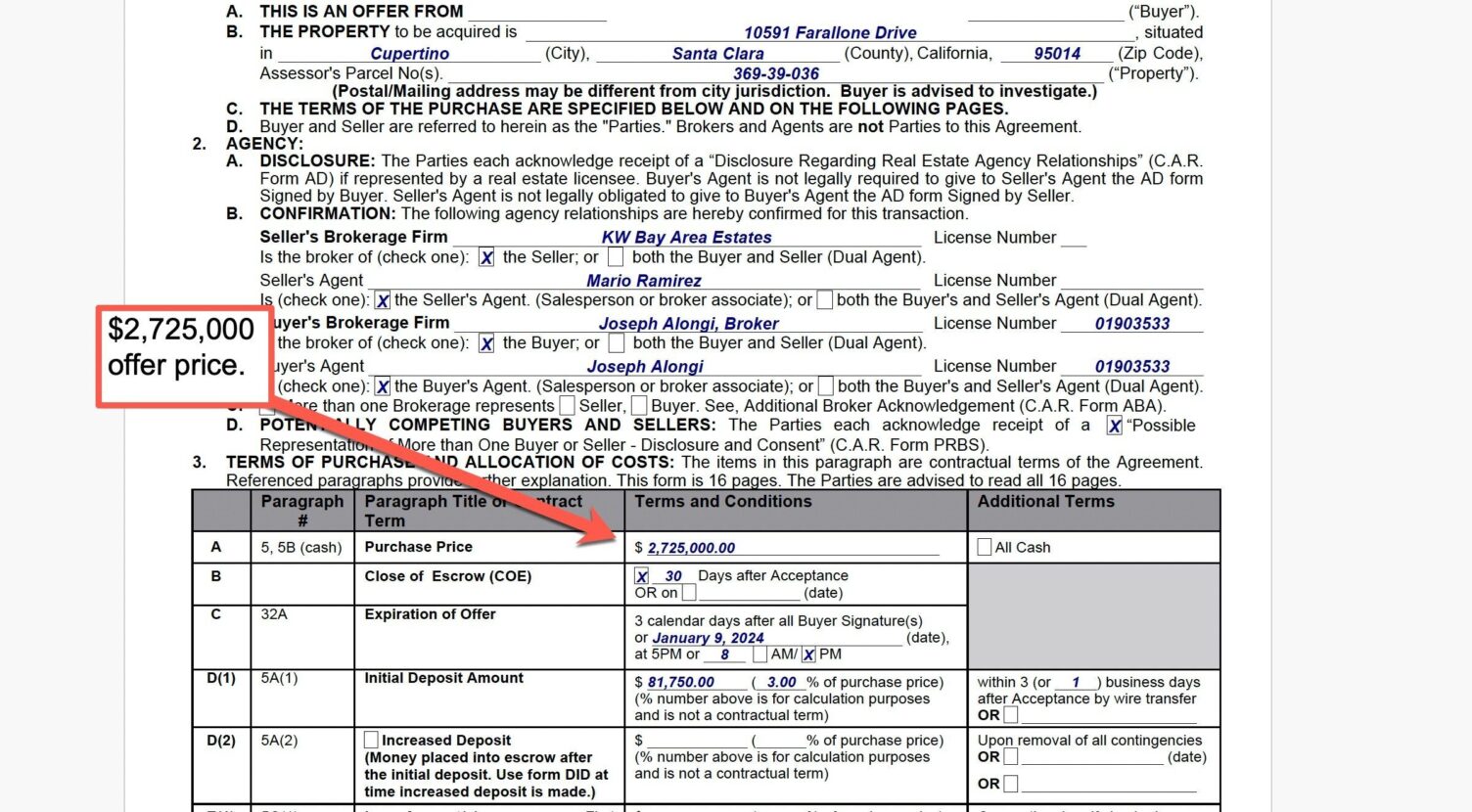
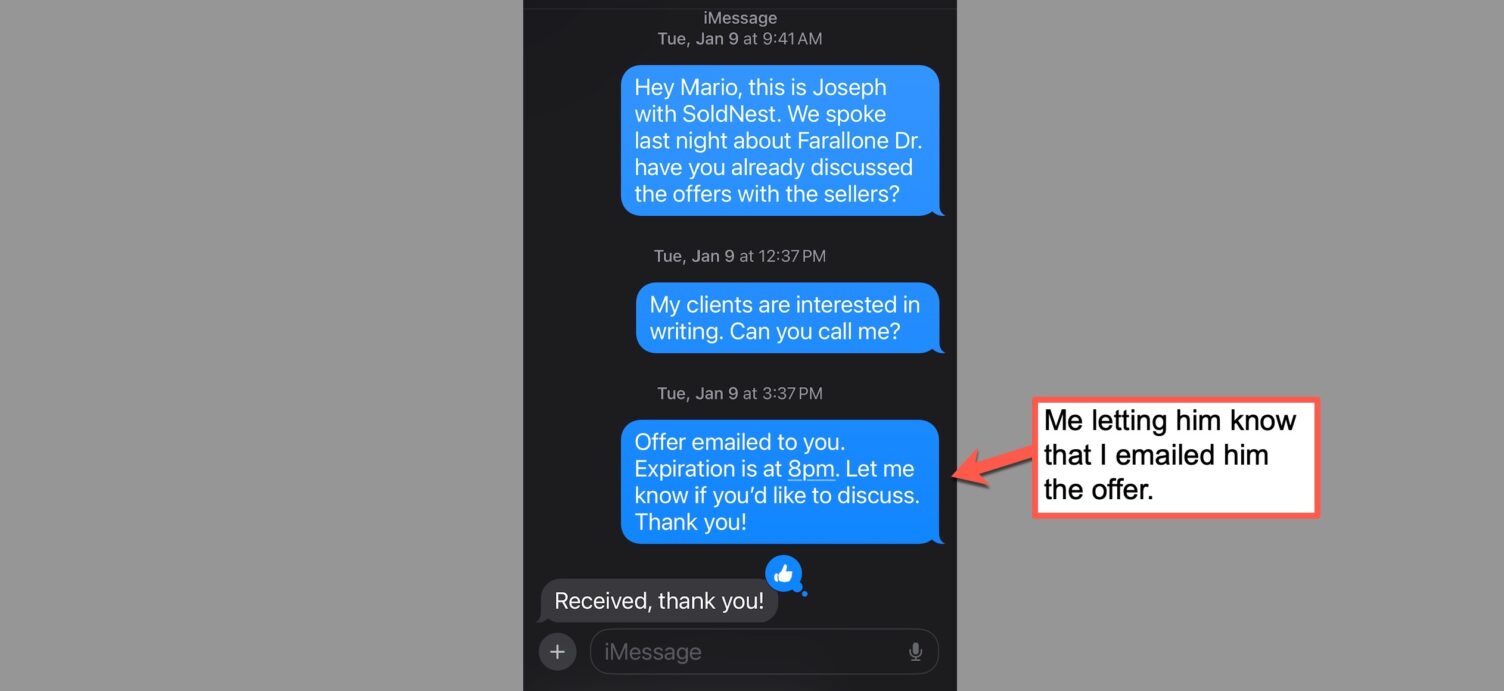
He sent me a text at 7:14 pm letting me know that his client would be making a decision the next day.
I discussed this with the buyers, and they said they were okay with extending the offer.
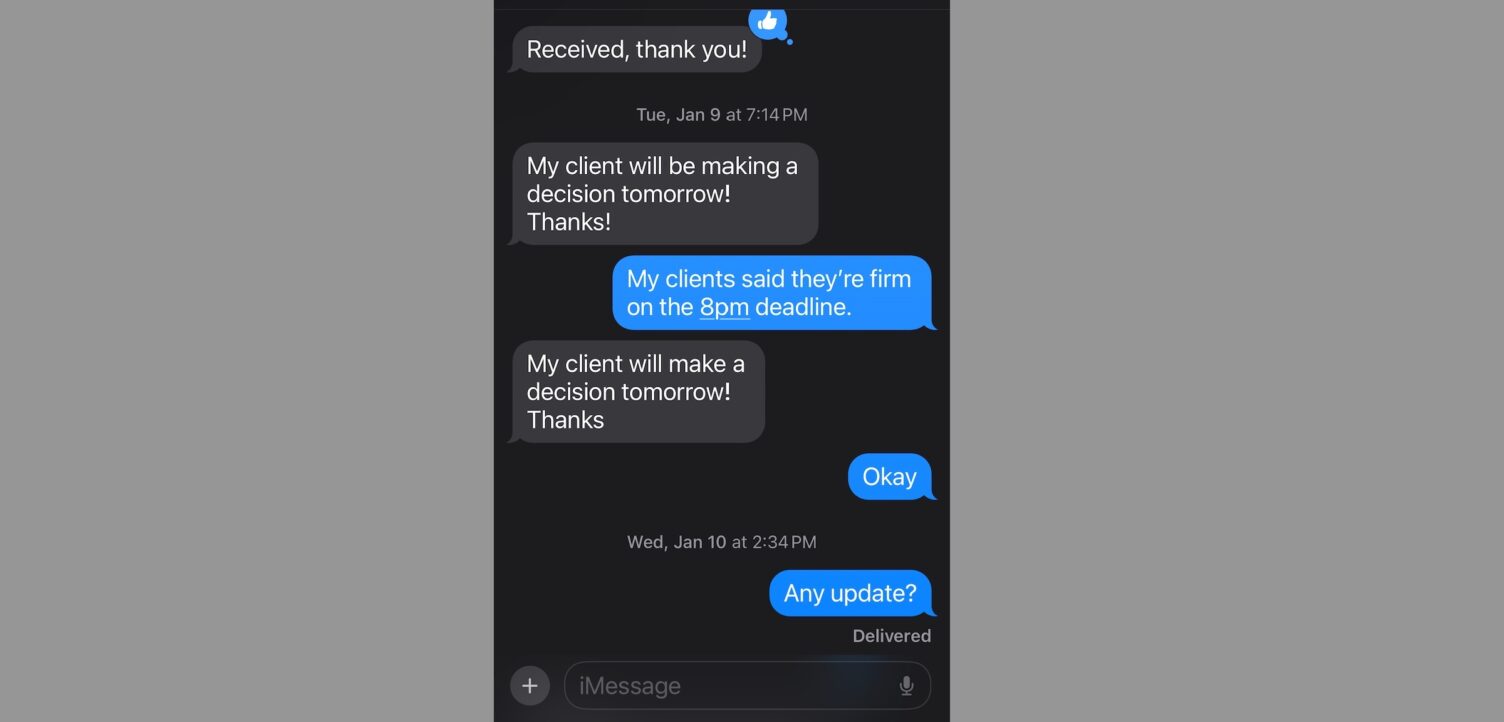
Then he sent me this text the following day…
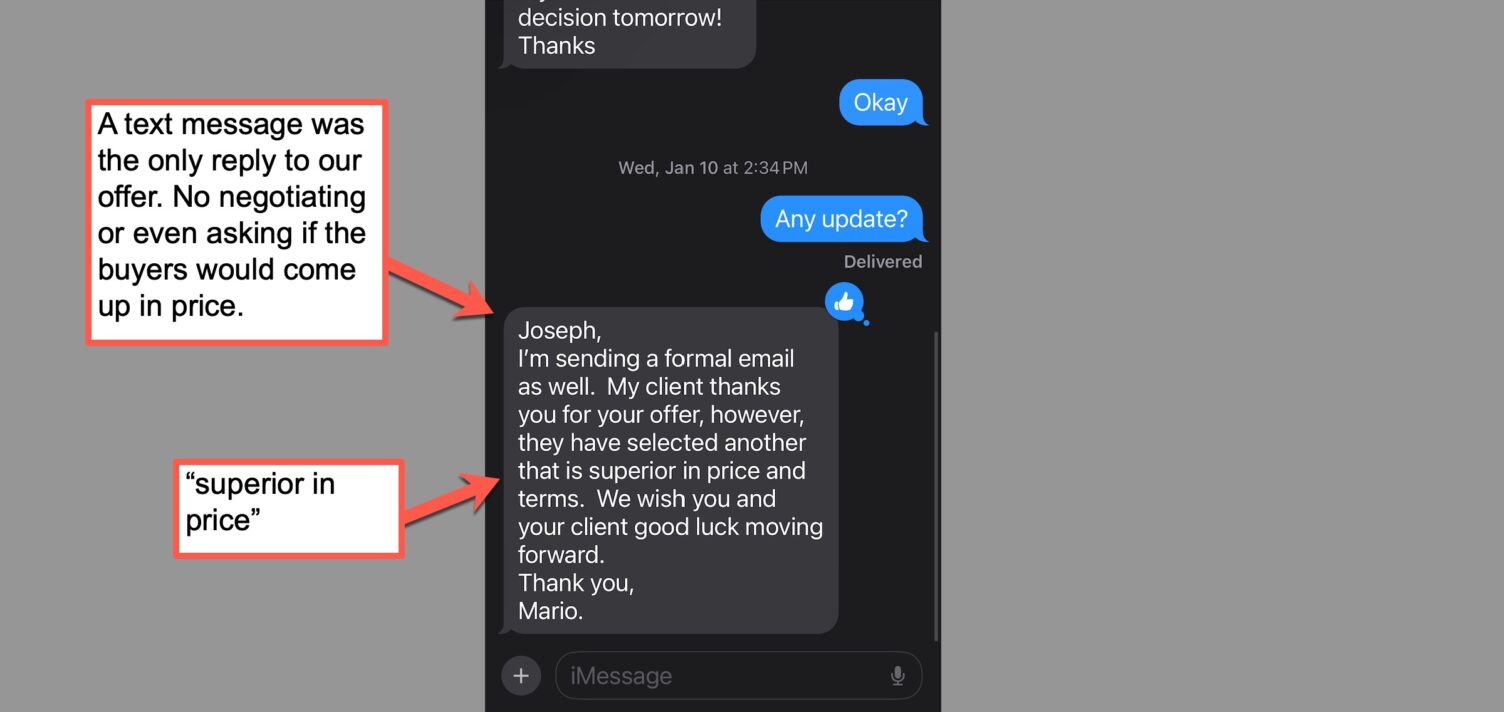
I immediately recognized the agent’s game as soon as I read that.
How did I know?
Because I’ve seen this cunning maneuver unfold numerous times.
A good agent will attempt to negotiate.
Even if it’s just a quick phone call or text to see if the buyers could come up in price.
This agent didn’t fight for his clients.
At all.
Instead, he kept his conversations with me minimal and avoided speaking on the phone.
Plus, the phrase “superior in price” seemed like an intentional tactic.
He was hoping I would overlook this situation and not monitor the final sale price when it closed.
Unfortunately for him, he didn’t realize that nothing infuriates me more than a shady real estate agent scamming a client.
And I have OCD.
So I waited until the transaction closed.
The final sale price?
$2,730,000.
Only $5,000 more than the non-contingent offer I submitted.
Any real estate agent is going to make an attempt to negotiate when there are two offers so close in price.
There’s a reason why he didn’t…
So that he can make more money by having his son, an agent he works with, represent the buyer without facing competition.
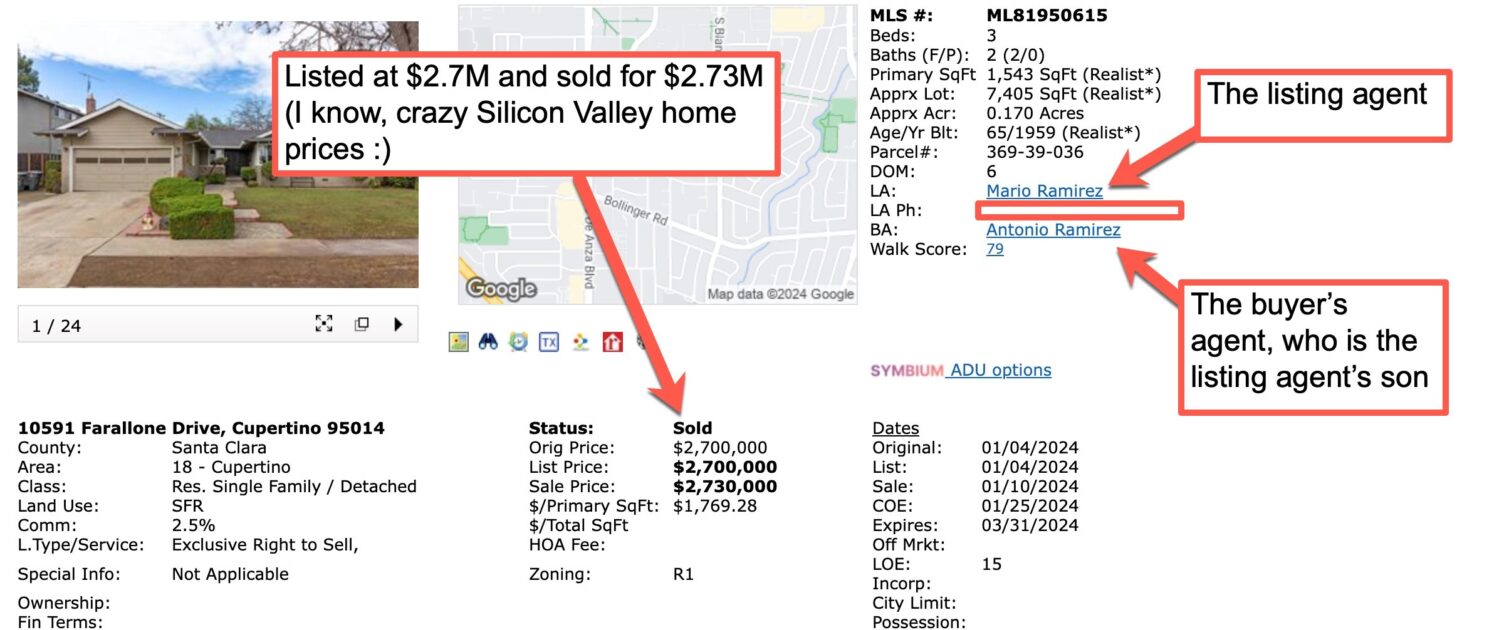
The buyers told me they were willing to come up to $2,790,000.
But the listing agent prioritized a higher commission above the seller’s best interests.
That means the seller potentially lost $60,000 — and I’m willing to bet that they have no idea.
That’s why analyzing this agent statistic is so important and why we include it in our agent screening process for sellers.
6. Lie about offers
Yes, some real estate agents lie about offers.
This tactic is used to instill FOMO (fear of missing out) in a buyer.
Either the buyer’s or seller’s Realtor can initiate this trick.
Here’s how this deceiving scheme unfolds…
The buyer’s agent will strongly sense that the buyer is very interested in the house.
Then, they’ll promptly contact the agent selling the house.
The goal for the buyer’s agent is to gather as much information about the home as possible.
And that includes determining whether the listing agent has any offers in hand.
This tactic becomes official when the buyer’s agent falsely tells the buyer that there are other offers, despite the listing agent confirming that there are none.
The buyer is trusting that their agent is honest and will help guide their offer strategy.
But the complete opposite is happening.
It’s a full-court press on the buyer’s emotions, exploiting their desire to own the home.
This is why you should be wary of a pushy conversation from your buyer’s agent about the seller receiving other offers.
Of course, it’s entirely possible for the seller to have another offer, or even multiple offers.
But a high-pressure tactic is usually a key indicator that your Realtor is exploiting FOMO to manipulate you.
This is how buyers end up offering a price much higher than what the seller would have accepted.
Although sometimes this occurs because the listing agent falsely tells the buyer’s agent that there are other offers, even when there are none.
How can you protect yourself against this trick?
Request that your buyer’s agent obtain the listing agent’s response about offers via email.
This will require both real estate agents to commit their statements to a written record.
Which will reduce the chances of either agent using this tactic.
7. Conceal the pitfalls of lower commission
Saving money on agent fees can be very appealing when selling or buying a house.
Most discounted real estate agents take advantage of this.
How?
By not disclosing the downsides of paying a lower commission.
It’s a hidden trick per se.
Of course, agents who rely on a low-fee business model aren’t going to come right out and tell you the drawbacks.
But they should.
Here’s why…
Agents who charge discounted fees typically run a high-volume business or are struggling.
Not knowing this before hiring a low-commission Realtor can be costly.
Why?
Because the money you think you’re saving on agent commissions can be far less than what you’ll lose in your sale price.
A high-volume Realtor does not have the capacity to put in the effort you need them to.
They’re too busy with other clients.
This can easily lead to leaving money on the table if you’re selling a home — or overpaying if you’re buying.
And the same can happen when working with a low-cost Realtor who is inexperienced or struggling.
They’re not as actively involved in your local market as you need them to be.
This is crucial because this is why a buyer or seller can be misguided on pricing and offer strategies.
How can you avoid this hidden trick?
- Confirm how many clients a prospective agent is working with and their number of recent transactions.
- Make sure you can cancel your agent agreement at any time, without owing any commissions.
These can’t guarantee that your agent has the expertise you need or will put in maximum effort.
But they can increase your chances of working with a Realtor who can give you both.
The right qualifications are key to a trustworthy agent
The real estate agents who are most likely to play tricks on you are the agents who do not possess the right qualifications.
This is why many buyers and sellers end up falling prey to one of these sneaky real estate agent tricks.
They don’t do the proper vetting ahead of time.
Instead, they work with a Realtor they know — solely relying on a friend or family member’s recommendation — or work with the “neighborhood expert.”
Those can be great ways to secure an agent — but they don’t mean the agent has the right qualifications (or can be trusted).
You need to make sure your agent has:
- Recent selling or buying experience (last 3 years ranking in the top percentile for your area)
- Outstanding reviews from previous clients
- A lower-than-average number of transactions where they represented the seller and buyer in the same sale
- An easy way for you to cancel the agent agreement (without owing commissions).
Those qualifications are the key ingredients to knowing how to choose a Realtor.
Because ensuring an agent has the right qualifications increases the likelihood of working with an honest professional.
Which means you’re less likely to have to watch out for a real estate agent’s sneaky tactics.
Our no-cost (and no-obligation) service can help you with this.
SoldNest screens agents for sellers to match them with a top local agent who is best qualified to get them the highest price.
You can learn more about how we can help you get the best agent by exploring our agent screening process for sellers.


